|
|
|
Sort Order |
|
|
|
Items / Page
|
|
|
|
|
|
|
| Srl | Item |
| 1 |
ID:
072521
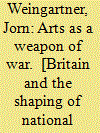

|
|
|
|
|
| Publication |
London, Tauris Academic Studies, 2006.
|
| Description |
viii, 238p.Hbk
|
| Standard Number |
1845110366
|
|
|
|
|
|
|
|
|
|
|
|
Copies: C:1/I:0,R:0,Q:0
Circulation
| Accession# | Call# | Current Location | Status | Policy | Location |
| 051365 | 700.94109044/WEI 051365 | Main | On Shelf | General | |
|
|
|
|
| 2 |
ID:
103101
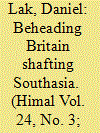

|
|
|
| 3 |
ID:
092776
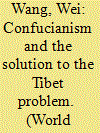

|
|
|
| 4 |
ID:
132058
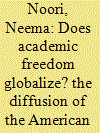

|
|
|
| 5 |
ID:
166777


|
|
|
|
|
| Summary/Abstract |
This article considers an episode of the television drama-documentary series Spy!, broadcast on the British Broadcasting Corporation in 1980. The programme proved controversial owing to its depiction of a physical assault during interrogation at an MI5 facility, Camp 020, during the Second World War. Numerous 020 veterans complained, pointing out that, with one exception, such physical violence had never taken place there. As their complaints were largely made in private correspondence with the BBC, which stood by its programme, the association of wartime British intelligence with physical abuse was allowed to go unchallenged in the minds of the viewing public.
|
|
|
|
|
|
|
|
|
|
|
|
|
|
|
|
| 6 |
ID:
047015
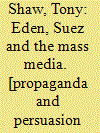

|
|
|
|
|
| Publication |
London, I.B. Tauris Publishers, 1996.
|
| Description |
xii, 268p.hbk
|
| Series |
Tauris Academic Studies
|
| Standard Number |
1850439559
|
|
|
|
|
|
|
|
|
|
|
|
Copies: C:1/I:0,R:0,Q:0
Circulation
| Accession# | Call# | Current Location | Status | Policy | Location |
| 044566 | 956/SHA 044566 | Main | On Shelf | General | |
|
|
|
|
| 7 |
ID:
168980


|
|
|
|
|
| Summary/Abstract |
The June 1941 German invasion of the Soviet Union unleashed a series of events that culminated in the Allied invasion of Iran two months later. In their propaganda, Britain and the Soviet Union publicly justified that invasion as a means of preventing Iran from falling into the German orbit. However, a review of radio broadcasts of the time shows the theme of a German menace was not widely believed in the region. Using BBC Summary of World Broadcasts transcripts from the period, this paper argues that the decision to base their propaganda on a lie also negatively affected relations in the postwar world. In that sense the decision to justify the invasion on the basis of German presence was a propaganda failure for the allies.
|
|
|
|
|
|
|
|
|
|
|
|
|
|
|
|
| 8 |
ID:
103567


|
|
|
|
|
| Publication |
2011.
|
| Summary/Abstract |
The British Broadcasting Corporation began recording, translating and publishing selected open radio broadcasts by foreign stations at the beginning of World War II. This open source intelligence, or 'Osint', was provided to the United States starting in 1941, and America's own monitoring agencies reciprocated, albeit with certain key restrictions. By mid-1943 the BBC monitored 1.25 million broadcast words daily. At the war's end, questions arose in Whitehall about maintaining the BBC Osint operation, but an interagency coalition prevailed over the cost-conscious Treasury. US-UK Osint exchanges broadened after the war as part of a larger set of bilateral intelligence-sharing agreements.
|
|
|
|
|
|
|
|
|
|
|
|
|
|
|
|
| 9 |
ID:
186517
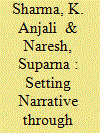

|
|
|
| 10 |
ID:
126011


|
|
|
|
|
| Publication |
2011.
|
| Summary/Abstract |
We are looking for the opening to the road to democracy,' said Aung San Suu Kyi during a frenetic press conference held in mid-November at the office of her party, the National League for Democracy (NLD), to mark the first anniversary of her release from house arrest. That year has been quite dramatic itself: Suu Kyi's image is now on newspapers and magazines near and far, the BBC is no longer forced to enter the country illegally, and Burma is set to chair the ASEAN regional bloc in 2014. Burma's generals had famously claimed that they were aiming to institute a system of 'discipline flourishing democracy' in the country - a vague phrase that only ever seemed to suit the needs of the military. Today, amidst new optimism, few have any more concrete answers on what might be taking place.
|
|
|
|
|
|
|
|
|
|
|
|
|
|
|
|
| 11 |
ID:
002140


|
|
|
|
|
| Publication |
London, John Libbey, 1992.
|
| Description |
vii, 100p.,tables
|
| Series |
Acamedia research monograph; no.7
|
| Standard Number |
0861963415
|
|
|
|
|
|
|
|
|
|
|
|
Copies: C:1/I:0,R:0,Q:0
Circulation
| Accession# | Call# | Current Location | Status | Policy | Location |
| 033620 | 355.020956/MOR 033620 | Main | On Shelf | General | |
|
|
|
|
| 12 |
ID:
099086


|
|
|
|
|
| Publication |
2010.
|
| Summary/Abstract |
The new Parliament will be asked at some point to make critical decisions about the BBC's future at a time when it is facing full-frontal assaults from competitors who view the BBC as a major barrier to their own advancement. Whether it be newspaper groups seeking to monetise their online activities, commercial children's channels, terrestrial competitors or the owners of music radio stations, media conglomerates rail against the BBC's size and public funding with increasing regularity. Our aim is to remind our legislators of the vital contribution this institution makes to British life: from a journalism inscribed with values of fairness, integrity and impartiality-and valued throughout the world for its professional engagement with foreign affairs-to its creative commitment to British story-telling, music, comedy, arts and children's programmes, the BBC's contribution to our democratic and cultural welfare is immense. It is a beacon for Britain, which provides social glue for its citizens at a time of fragmenting audiences and identities, within a uniquely non-commercial space, accountable to both Parliament and its licence payers. It may distort the market, much as the National Health Service distorts the market for health care, but is held in high esteem by the British public and is admired throughout the world. This article explains why the BBC is a national treasure that underpins our creative economy as well as our cultural vitality, and argues that it must be protected from those who argue self-interestedly for its diminution.
|
|
|
|
|
|
|
|
|
|
|
|
|
|
|
|
|
|
|
|
|